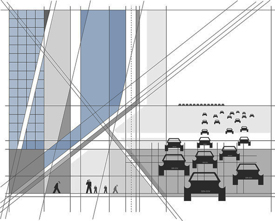Airquakes: Climate Change, Ontology and Urbanization
Albert Pope
Monday, 04 Apr 2016 at 5:00 pm – Benton Auditorium, Scheman Building, Iowa State Center
Albert Pope is a key voice in the world on questions of urbanization, urban form and problems of the contemporary city, tying together discussions of architecture, design, space, philosophy and politics in a way few others do. He has written and lectured extensively on the broad implications of post-war urban development and is the author of Ladders, a book-length study of the postwar American City. His current research addresses the urban implications of climate change. Pope is the Gus Sessions Wortham Professor of Architecture at Rice University and director of the school's Present/Future Program. He received his B.Arch at Southern California Institute of Architecture, and his M.Arch from Princeton University. Part of the Center for Excellence in the Arts & Humanities Symposium "What Is the Urban?"Cosponsored By:
- Anthropology
- Architecture
- Center for Excellence in the Arts & Humanities
- Climate Science Program
- Community & Regional Planning
- DATUM: Student Journal of Architecture
- English
- Geological & Atmospheric Sciences
- Global Resource Systems Program
- History
- Committee on Lectures (funded by Student Government)
Stay for the entire event, including the brief question-and-answer session that follows the formal presentation. Most events run 75 minutes.
Sign-ins are after the event concludes. For lectures in the Memorial Union, go to the information desk in the Main Lounge. In other academic buildings, look for signage outside the auditorium.
Lecture Etiquette
- Stay for the entire lecture and the brief audience Q&A. If a student needs to leave early, he or she should sit near the back and exit discreetly.
- Do not bring food or uncovered drinks into the lecture.
- Check with Lectures staff before taking photographs or recording any portion of the event. There are often restrictions. Cell phones, tablets and laptops may be used to take notes or for class assignments.
- Keep questions or comments brief and concise to allow as many as possible.



